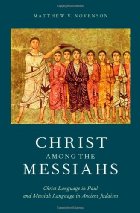Richard Carrier’s original post, The Dying Messiah (October 2011)
It is frequently claimed, even by experts in the field, that no Jews expected their messiah to be killed, that all of them expected a militarily triumphant übermensch. And therefore Christianity went totally off-book when it came up with the idea that their “failed” messiah was the “real” messiah. But this is actually demonstrably false. Some Jews did expect a dying messiah.
Thom Stark responded: The Death of Richard Carrier’s Dying Messiah, Part 1 (April 2012) and Part 2 (May 2012).
I’ll look at two major pieces of evidence Carrier provides for his thesis and show why they really come to naught, when examined properly.
Richard Carrier has since replied: The Dying Messiah Redux (June 2012)
Last year I made the case that the idea of a “dying messiah” was not wholly anathema to Jews and even already imagined by some before Christianity made a lot of hay out of the idea. I have since made small revisions to that article (The Dying Messiah) to make its claims and evidence clearer. This year, Thom Stark (a seminary graduate) wrote a response (The Death of Richard Carrier’s Dying Messiah). His analysis has changed my opinions on some matters, but ultimately it’s a fail.
I have drawn primarily on the arguments of Thomas L. Thompson to argue in older posts that a dying messiah was certainly not a foreign concept in the Jewish literature. The first messiah, anointed one, ever mentioned, for example, was a high priest whose death liberated certain exiles for inadvertent sin. My ongoing series of what the term “messiah” meant to Jews in Paul’s day — based on Matthew Novenson’s Christ among the Messiahs — will also make relevant contributions to this discussion.


